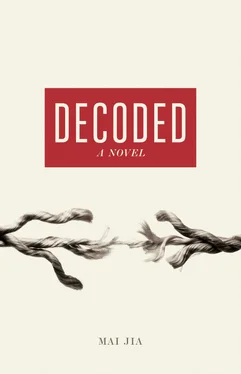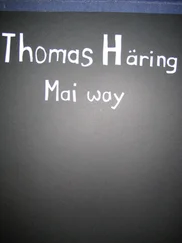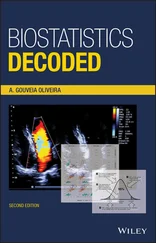Mai Jia - Decoded
Здесь есть возможность читать онлайн «Mai Jia - Decoded» весь текст электронной книги совершенно бесплатно (целиком полную версию без сокращений). В некоторых случаях можно слушать аудио, скачать через торрент в формате fb2 и присутствует краткое содержание. Год выпуска: 2014, Издательство: Allen Lane, Жанр: Современная проза, на английском языке. Описание произведения, (предисловие) а так же отзывы посетителей доступны на портале библиотеки ЛибКат.
- Название:Decoded
- Автор:
- Издательство:Allen Lane
- Жанр:
- Год:2014
- ISBN:нет данных
- Рейтинг книги:3 / 5. Голосов: 1
-
Избранное:Добавить в избранное
- Отзывы:
-
Ваша оценка:
- 60
- 1
- 2
- 3
- 4
- 5
Decoded: краткое содержание, описание и аннотация
Предлагаем к чтению аннотацию, описание, краткое содержание или предисловие (зависит от того, что написал сам автор книги «Decoded»). Если вы не нашли необходимую информацию о книге — напишите в комментариях, мы постараемся отыскать её.
Decoded — читать онлайн бесплатно полную книгу (весь текст) целиком
Ниже представлен текст книги, разбитый по страницам. Система сохранения места последней прочитанной страницы, позволяет с удобством читать онлайн бесплатно книгу «Decoded», без необходимости каждый раз заново искать на чём Вы остановились. Поставьте закладку, и сможете в любой момент перейти на страницу, на которой закончили чтение.
Интервал:
Закладка:
To tell you the truth, he was a terrible husband, completely unreasonable. He would often not return home for days, sometimes staying away for the best part of a couple of weeks; and then when he did go home, he would hardly say a word to his wife: he would just eat then leave again, or eat, sleep, and then leave when he got up. That was their married life. They lived together but she rarely saw him, and spoke with him even less. As section chief, an administrative leader, Rong Jinzhen was not up to the task. Generally, he would show up at his office an hour before the day ended; the rest of the time he was squirreled away in the his cryptography room. He would even unplug the telephone to ensure that he would not be disturbed. It was in this fashion that he shirked the responsibilities and pains of being a section chief as well as a husband. He seemed to preserve his customary habits and longed-for style of life: a solitary existence — living alone, working alone, not wanting anyone to trouble him or to help. What’s more, things only became more extreme after BLACK entered the picture. It was as if he had to hide himself away, that doing so was the only means by which he could find the hidden secrets of this cipher. . [To be continued]
Rong Jinzhen was reclining in a rather cosy soft sleeper bunk, feeling as though he had finally found a safe place to take refuge in. It had been indeed rather fortunate that Vasili had secured two berths in a soft sleeper car. Their travelling companions were a retired professor and his nine-year-old granddaughter. The professor must have been around sixty years old. He had previously served as vice-chancellor at G university, but because of an eye disease he had resigned not long before. He carried himself with authority, liked to drink and smoke Pegasus cigarettes — this was how he whiled away his time on the road. His granddaughter, who aspired to be a singer when she grew up, spent the time singing, using the carriage as a stage. The two of them, one old, one young, served as a tranquilizer for Rong Jinzhen, putting him at ease. In this simple and unsophisticated space, he felt devoid of any sense of foreboding. Or to put it another way, he was able to forget his own timidity, and he devoted his time to his two most important endeavours: sleeping and reading. Sleep compressed the long dark nights into a dream; reading dispatched the boredom of the days. Sometimes he would lie in the dark, unable to sleep, unable to read, and instead passed the time by letting his imagination run wild. This was how he spent the journey home — engaged in sleeping, reading, and flights of fancy. The hours slipped by one after another, as he gradually drew ever closer to the last leg of the trip and home, back to Unit 701.
The second day of the trip was coming to a close. The train was briskly making its way through a wide open field. At the far end, the setting sun was flushed red; its last rays of crimson light had a beautiful, benevolent hue. The remaining sunshine bathed the train in a warming, tranquil light, much like a dreamscape or a gentle landscape painting.
During dinner, Vasili and the professor struck up a conversation which Rong Jinzhen only listened to with half an ear. That was until the professor said in an envious tone of voice, ‘Ah, we’ve just entered G province — by tomorrow morning you two will be home.’
Hearing this was music to Rong Jinzhen’s ears, and he asked, ‘When will you arrive at your destination?’
‘Tomorrow, at three in the afternoon.’
That would be the terminus for the train. Rong Jinzhen joked, ‘You two are certainly faithful passengers: you’ve accompanied this train from beginning to end.’
‘While you are a deserter. . ’ The professor laughed heartily. It was quite evident that he was happy to have found people to talk to on the train. But his happiness was fleeting. After a couple of chuckles, Rong Jinzhen once more turned his attention to Johannes’ The Riddle , paying the professor little heed. All the latter could do was stare at him curiously, wondering whether or not he might be unwell.
Rong Jinzhen was not ill, of course; this was simply his customary manner. Once he had finished what he wanted to say, then he was finished. He didn’t drag things out, he didn’t switch topics, he wasn’t polite; there was no preface, no postscript: he spoke when he had something to say, he was silent when there was nothing to say — like talking in one’s sleep, he made his interlocutors feel as if they too were dreaming.
Speaking of Johannes’ The Riddle , it had been published by the China Publishing House before the Revolution, translated by the Eurasian author Han Suyin. It was a rather slim volume, more a pamphlet than a book. On the title page it had the following epigraph:
A genius is the spirit of this world, there are few but they are the finest of humankind, they are noble, they are to be treasured. Like any other treasure in this world, they are delicate, fragile as a newly planted bud; once hit they crack; once cracked they fracture.
These words hit Rong Jinzhen like a bullet. .
[Transcript of the interview with Director Zheng]
Genius is easily broken. This was not news to Rong Jinzhen, nor was it a topic he was uncomfortable with; many times before he had discussed it with me. He said, ‘This fragility is what makes a genius, a genius. It is what allows them to transcend all limits, to become ever more refined, like gossamer silk; to become almost transparent, but to be unable to bear any knock. In a sense, a person’s intelligence can exceed any frontier, and from a certain perspective knowledge can easily be seen as limitless. But in another sense, we could say that erudition is achieved by sacrificing a broad knowledge of the world for the particular. Therefore, on the one hand, the great majority of geniuses are incredibly sensitive and learned, but on the other, they are stupid and clumsy, incorrigibly obstinate, very unlike ordinary people. The exemplar of this sort of person was Professor Klaus Johannes, a legend in the field of cryptography, and Rong Jinzhen’s personal hero. The Riddle was his work.
No one would deny that there was something almost godlike about Johannes’ ability; he was beyond reach, a god himself really. Nothing could disturb him. He knew the ciphers behind the ciphers! But in the real world, in life, he was a fool, a fool who didn’t even know his way home. He was like a house pet — if he was let out without a collar, he mightn’t return. The story goes that he was like this because his mother had been so afraid of losing him that she wouldn’t let him out of her sight, shadowing his every movement and making sure he always returned home.
It goes without saying that from his mother’s perspective, he was, without a doubt, an abysmal child.
Nevertheless, in the first half of the last century, in the fascist camp, this man — this thoroughly sheltered and socially inept child — was known as the Grim Reaper: he could make Hitler piss in his pants at the mere mention of his name. Johannes was actually from the same place as Hitler, born on an island named Tars (known for its gold deposits). If it’s true that every man needs to have an ancestral homeland then his was Germany, and Hitler at that time was the commander-in-chief. You could say he should have been serving Germany, serving Hitler’s Reich. But he didn’t, at least not from start to finish (he had at one time). He was the enemy of no country, of no individual — his only enemies were ciphers. At any given time he might become the enemy of a certain nation, a certain person, but at any other time he might become the enemy of some other country, some other person: it all depended on who — which country, which person — had created and used the most complicated secret cipher. Whoever possessed such a thing was his adversary.
Читать дальшеИнтервал:
Закладка:
Похожие книги на «Decoded»
Представляем Вашему вниманию похожие книги на «Decoded» списком для выбора. Мы отобрали схожую по названию и смыслу литературу в надежде предоставить читателям больше вариантов отыскать новые, интересные, ещё непрочитанные произведения.
Обсуждение, отзывы о книге «Decoded» и просто собственные мнения читателей. Оставьте ваши комментарии, напишите, что Вы думаете о произведении, его смысле или главных героях. Укажите что конкретно понравилось, а что нет, и почему Вы так считаете.












